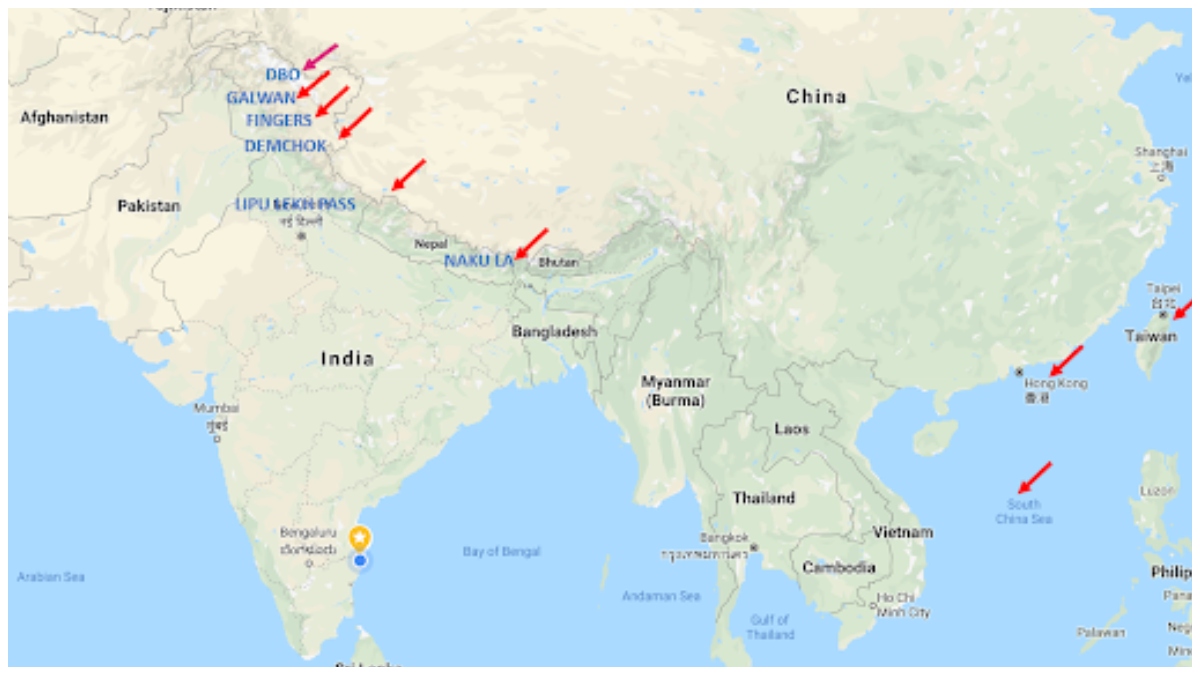
Let your plans be dark and impenetrable as night, and when you move, fall like a thunderbolt. —Sun Tzu
At the outset, the faceoffs at Galwan and Nakula are uncharacteristic; in hitherto-fore undisputed areas. These have a co-relationship. Currently there are three ongoing standoffs between India and China at Demchok, Fingers and Galwan areas. Probably one more at DBO as per some reports. These have been analyzed by experts. However. What is China’s motive in these actions? That is not clear. When I was pondering about it, my mind went back to 1999 when I was commanding my Artillery unit in direct support of the Muguthang Brigade. The penny dropped for me and a very plausible motive came forth. I could be wrong and called a fool for it. That is OK. However even if I am partially right and ignored, we might be in for national embarrassment.
A macro review of the military aggression of China is warranted. China starts recovering from the virus situation internally. It sees that others getting affected badly. Its economy seems to be regaining speed. Its mask diplomacy and wolf warriors come into play aggressively. China starts hyping nationalism internally through “saviour of the world”and “global leadership”theories. A strategic window opens. The People’s Liberation Army Navy(PLAN) becomes aggressive with Vietnam, Malaysia, Philippines, Brunei, Indonesia, Japan and South Korea to consolidate its hold in the East China,South China and Yellow Seas. The US and Western countries get pandemically stricken. Thewindow widens especially when the US carriers are off line due to the pandemic. There is a nationalist call and plans are probably made for a cross straits action. However, China realises that the window available for invasion of Taiwan is too small and it backtracks. Around this time China starts suffering severe backlash specially from the US, Australia, and EU. It senses isolation. Its economy is on the verge of heavy contraction. Rising unemployment could lead to unrest. The period of strategic opportunity is over. BRI is going badly with everyone asking for debt write-offs. Relocation and decoupling from China is a reality. There is an impending export collapse. Chinese investments are being blocked globally. Global leadership is fading. The worst backlash since Tiananmenis on the cards.
The situation can be turned around only by doing something spectacular. With US aircraft carriers returning to operational status after the infection is cleared, spectacular gains in the South China Sea are passe. So turn to India. However, India poses problems. Of late it has given a cold shoulder to China. Its strategic shift is towards the US. It is even supporting Taiwan. It has a strong connect with Japan. It spurned joining BRI and RCEP. It has been steadily improving its border infrastructure.It abrogated Article 370. Further it has also blocked Chinese investment. It hasassumed regional leadership during the pandemic. Countries are looking towards it. It is also aiming at global leadership. Indian leadership of WHO could go against China. It is also trying to attract investment which is decoupling from China. Its self-sufficiency programme is to reduce imports from China. Others will follow suit in the region. It provides sanctuary to the Dalai Lama and Tibetans. Most importantly it made China lose face in Doklam and that should be repaid back. Overall, it is the biggest threat to China in the region.
The opportunity is that India is also a soft country and can be coerced to fall in line. Its economy is in shambles. As per estimates once the virus spreads it will badly affect India. When the Virus is rampant, strike India, and coerce it. In doing so,frighten others off from looking at India as a leader, investment destination or an alternate to China. Once India is shown as weak, threaten others with similar fate to crush decoupling attempts from China. Striking India will also break the Quad. It will prove to the world that China is the only power that matters especially since the US is visibly declining.Very importantly, international focus is on South China Sea. Everyone expects India to look after itself. Hence it is isolated militarily. Pakistan will pounce on any opportunity to tie down Indian Forces. Nepal, Sri Lanka Bangladesh, and Myanmar can be arm twisted to act against India.
How does one coerce India militarily to achieve its objective? PLA is in transition from being land based to ocean based. PLAN and PLAAF do not have the capability yet to venture into the Indian Ocean. Whatever has to be done has to be on the land borders.
However, on the land, India is strong. It has greater experience in the Himalayas and has considerable war fighting experience. PLA does not enjoy numerical superiority to defeat Indian Army. Also use of force or threat does not deter India. In any case, against the nuclear backdrop any major conflict is not possible. Further due to the pandemic, it will be inadvisable to commit major forces from the Chinese hinterland and leave the East Coast vulnerable for long. Hence any operation has to be tactical in nature with limited objectives for great strategic outcomes. What are the options for that?
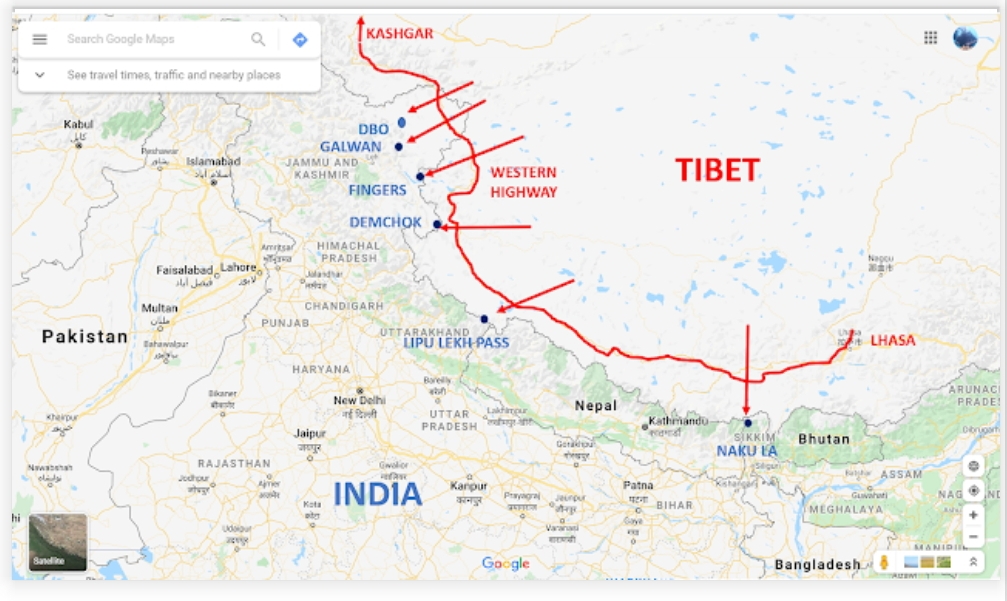
There are viable offensive options available in Eastern Ladakh, Sikkim and Arunachal Pradesh. However, any option in Arunachal Pradesh needs large force levels to achieve political objectives. Hence the choice is Eastern Ladakh and Sikkim. Both these meet the criteria for achieving the overall objective. The criteria being low force levels to keep low conflict thresholds. It should be an extension of a dispute which can be argued as Indian aggression taking advantage of Chinese weakness. Effect should be that Indian position is visibly compromised, cannot retaliate and China is at a permanent advantage. Deception should hide the real intent and target till execution. Most importantly, there should be a tried and tested formula if available.
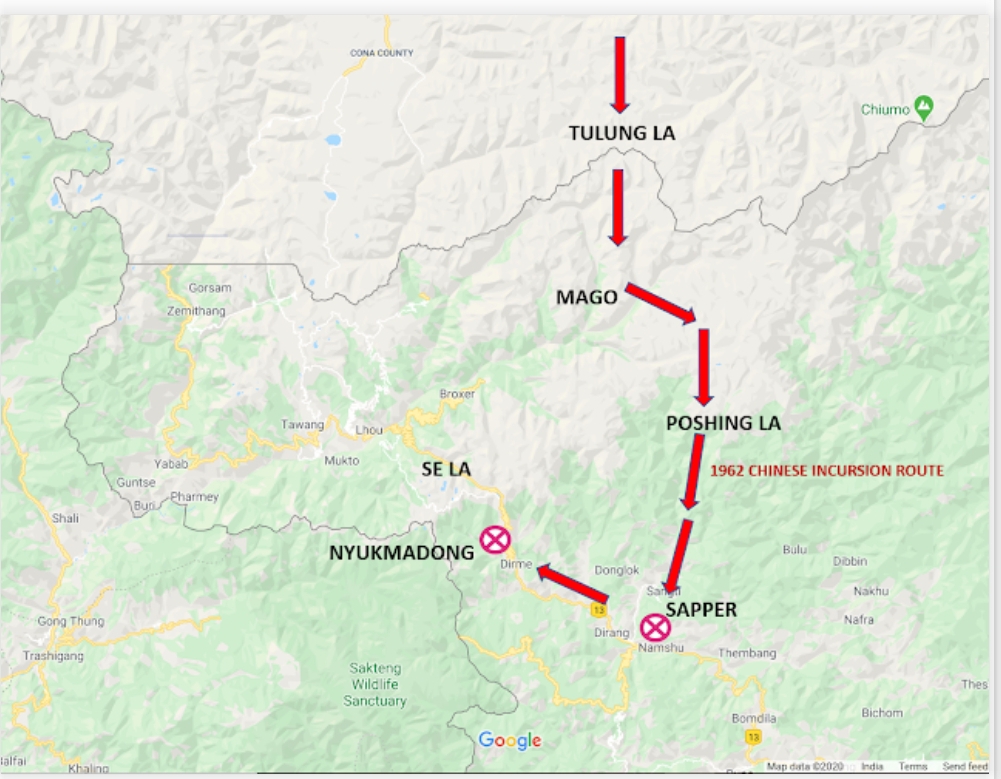
In 1962 ops China infiltrated sizeable forces via Tulung La, Mago, Poshing La and established roadblocks at Nyukmadong and Sapper. These roadblocks paralysed India leading to its capitulation. The model can be replicated here in a shallower form consistent to current military situation and requirements.
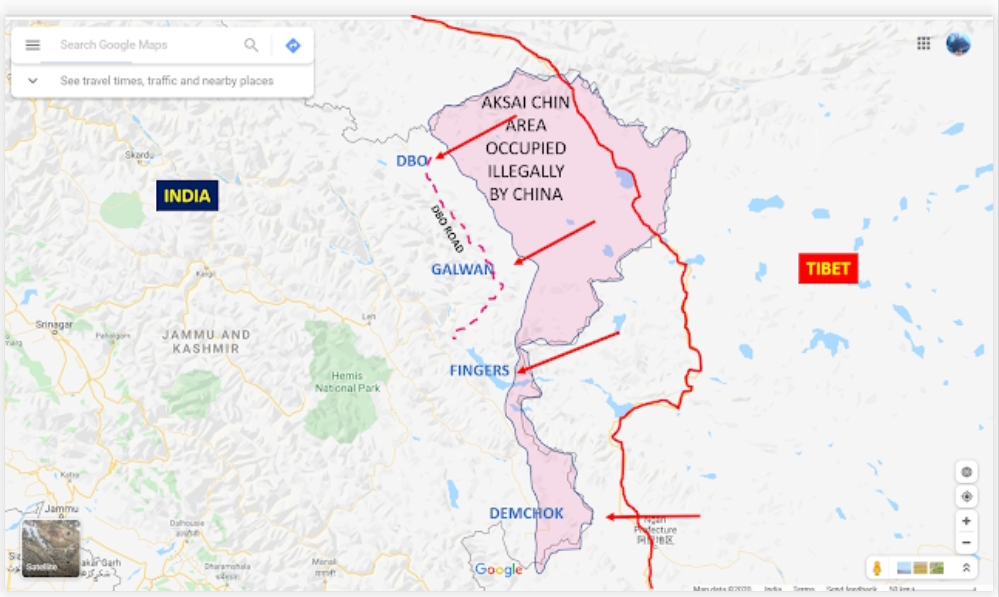
The first target in Ladakh is the Road from Darbuk to DBO.The road recently completed (after 18 years) connects to Karakoram Pass. This gives direct access to Xinjiang. Access to Xinjiang poses real destabilising threat to China in the sensitive Uighur Area which is bordered with Pakistan, Afghanistan, Tajikistan, Kyrgyzstan, and Kazakhstan. It has a long-term threat to destabilise the CPEC also since Karakoram Pass is close to the area ceded by Pakistan to China. So, if this road is interfered with/ cutoff, India will be heavily disadvantaged.
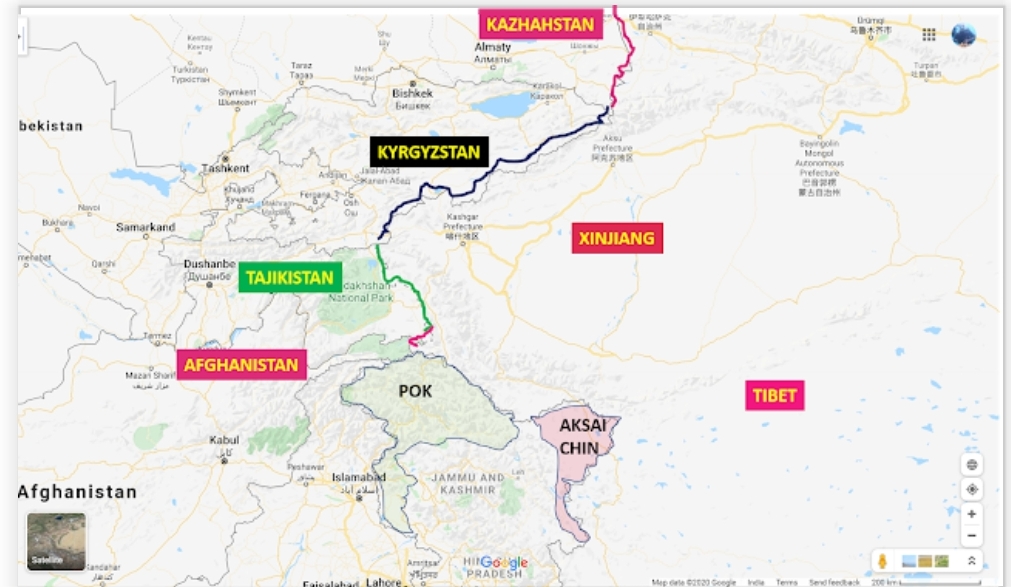
The Galwan Valley is the closest to the road. The incursion at Fingers area is a standard one for local deception. If things escalate there is a need to deny India any offensive options with a preemptive incursion at Demchok. It is closest to Tashigang and the Western Highway which could be Indian targets. As things have panned out, the effort to cut off the DBO road appears to have fallen through due to the alertness of the Indian Army. However, the PLA has dug in non-tactically in a “show of force” after incursion. As it stands the standoff might not result in coercion as planned. Hence the other option must be put into effect.
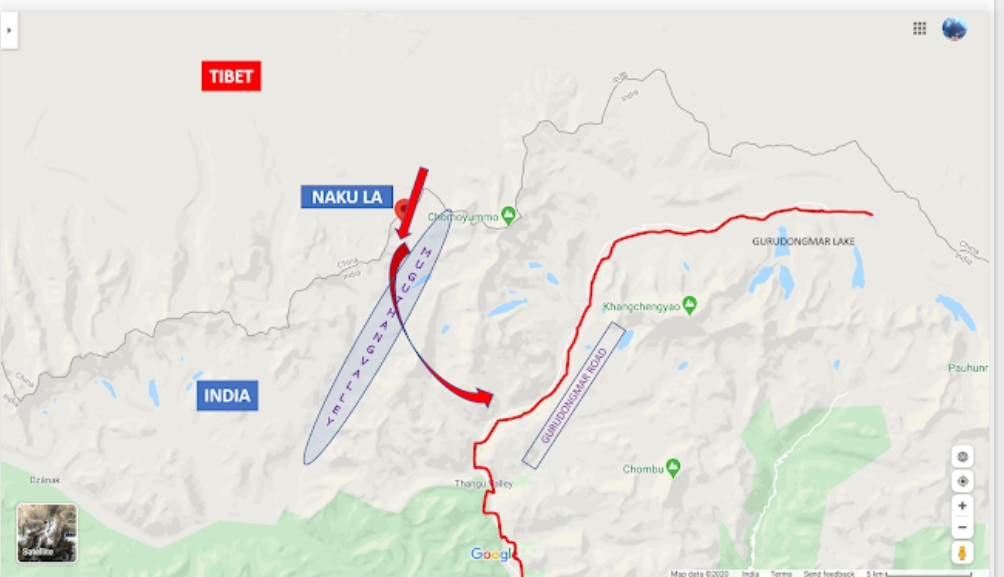
The second target in Sikkim is the Gurudongmar Road, North of Thangu Valley. It can beapproached through Naku La and the parallel Muguthang Valley (see map). There are some passes on the intervening ridge between the Muguthang and Thangu Valleys to enable an indirect approach to the Gurudongmar Road. A block on this Road will cut off Indian Forces in the North, cut off access to the Tibetan Plateau,open Chinese offensive options into Sikkim, It broadens the baseand reduces vulnerability of the Chumbi Valley. it will be an ideal answer to the Doklam face-off.
It will be a surgical action with options for offensive, defensive or withdrawal. It is a tactical action with a strategic fallout. Its depth can be clouded as part of the unsettled boundary. This is the priority option for Chinese under these conditions and the worst-case option for India. It needs a sizeable force to infiltrate by stealth. The standoff/patrol clash at Naku La is likely to be part of the recce being carried out. For this plan to succeed there is some orchestration to be carried out. These include deception and propagandist projection to resort to armed action. This has been going on. Let us analyse that.
The overall aggression by Chinese and the number of flash points initiated, hide the real McCoy. All of us expect some great action in South China Sea. Note that Wolf Warrior diplomats have been active elsewhere but in India. Here diplomacy is low key and conciliatory. The multiple aggression in Ladakh has focused us there. Pakistan has upped its bleat and instigated action in Kashmir. Nepal suddenly lays claim to LipuLekh Pass. India and China have initiated some talk to de-escalate but that is only initial stages. The Chinese Ambassador has stated that the Elephant and Dragon can dance. Sweet talk to lull the opposition to thinking of peace whilst thickening the fog of war. His statements are ambiguous. Is he waving a red or white flag? In any case have you ever seen an Elephant dance with a Dragon?It would be grotesque. Even the Global Timeshas been uncharacteristically soft on India whilst spewing venom on others. In the meantime, assess the Chinese internal situation — high nationalism, socially unstable,militarily aggressive and economicallyuncertain with the pandemic threat still in air. The international situation is hot. Hong Kong is going awry. Taiwan is openly extending support to so-called separatists there. The US has made threatening noises about Tibet. Isolation is on the cards. Xi Jinping and the Chinese Defence Minister have openly told PLA to be ready for armed conflict. Has the stage has been set for Naku La?
As I have stated earlier, the Chinese may have miscalculated on the Indian Army being adversely affected by the virus. However, on deception they are on the mark. They are on course with their timing. In their estimate they have already whetted the nationalist hunger through actions in South China Sea, Hong Kong, Taiwan and Ladakhto some extent. They need to do more to take it to its logical conclusion. They will execute their plan if we let them to do so. I am sure after this, concerned people will take action to forestall the Chinese plan. It is quite simple, and I am sure it will be attended to. I again admit that I could be wrong. However, in this high-risk business of military analysis, the wrong input often leads you to the correct answer. Most importantly like the rest of the world, I do not trust China. They cheat, thieve and care two hoots about International law. Theirguarantees are not worth the toilet paper they are written on.
The next question. Having foiled Chinese designs so far what is the next step? Evict them back by force or leverage them to with a counter intrusion elsewhere or exercise asymmetric options or cave into their coercive demands (which will soon follow)? The Chinese have come in with a plan. We need to evict them with an equally astute one.
Lt Gen P.R. Shankar was India’s DG Artillery. He contributed significantly to the modernisation and indigenisation of artillery. He is now a professor in the Aerospace Department of IIT Madras and is involved in applied research for defence technology.